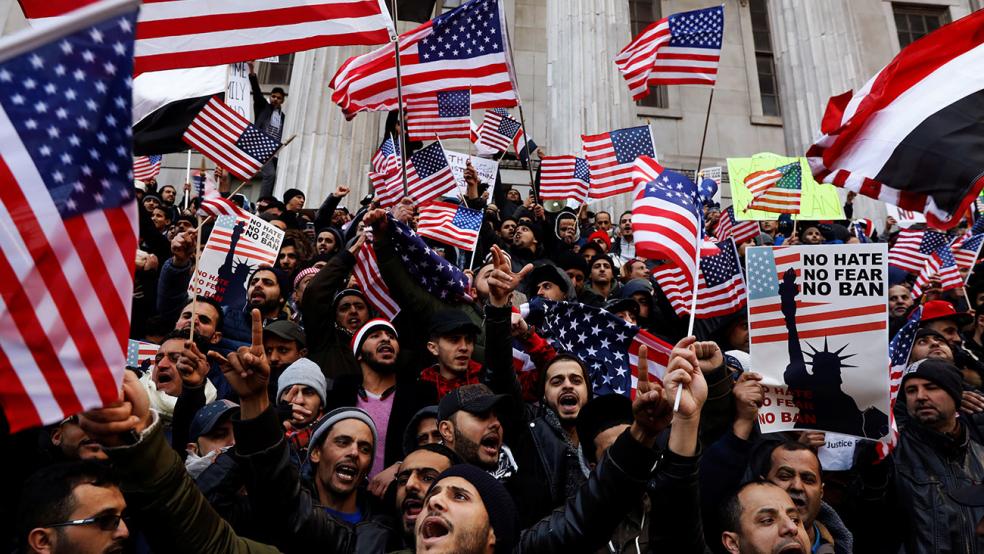The travel and tourism and industry had been hoping that the Trump administration’s second effort at a travel ban would be more welcoming to foreign travelers coming to the United States. They were disappointed.
A new executive order signed today reaffirms the elimination of the Visa Interview Waiver Program, which allows frequent travelers to the United States an expedited way of renewing their visas. It also proposes an extensive new program of “Uniform Screening and Vetting Standards for All Immigration Programs” that will almost certainly make travel to the United States much more inconvenient for people from many countries.
Related: Whatever the Courts Say, Trump’s Travel Ban Is Already Working
The new order replaces the controversial one that Trump signed in late January, and which was subsequently challenged in court after it left hundreds of people with valid travel documents stranded in airports around the world.
Among other things, the order signed today does a lot of cleanup work necessitated by its predecessor. It clarifies the status of legal permanent residents and people holding valid visas, and goes into detail about possible case-by-case exceptions. The new order removes Iraq from the list of countries whose residents are barred from entering the U.S. for 90 days, a move that had infuriated the many Iraqis actively fighting alongside U.S. advisers against the terror group ISIS. The other six countries from the original list -- Iran, Yemen, Somalia, Syria, Libya and Sudan -- remain.
The order also creates a 120-day halt to the Refugee Admissions Program, citing concerns that terrorists might be able to infiltrate groups of legitimate refugees to gain entry to the country.
However, while the highest profile element of the new executive order is its effect on refugees and residents of the designated countries, there is good reason to worry that it will have a negative effect on many U.S. businesses that rely on tourism.
Related: Is Trump’s Travel Ban Already Hurting US Tourism?
First of all, eliminating the Visa Interview Waiver Program will make it much more inconvenient for business travelers from many countries to repeatedly enter the United States. Every time a visa expires, they will be required to submit to a sit-down interview with a consular official in their home country in order to get it renewed. Previously, they were allowed to drop off their passports at a U.S. embassy or consulate where a visa application would be processed without scheduling an interview.
The executive order also contemplates a ramped-up vetting process that will make it more difficult and time consuming for people interested in traveling to the United States as tourists to get here in the first place.
The order calls for “a uniform baseline for screening and vetting standards and procedures, such as in-person interviews; a database of identity documents proffered by applicants to ensure that duplicate documents are not used by multiple applicants; amended application forms that include questions aimed at identifying fraudulent answers and malicious intent; a mechanism to ensure that applicants are who they claim to be; a mechanism to assess whether applicants may commit, aid, or support any kind of violent, criminal, or terrorist acts after entering the United States; and any other appropriate means for ensuring the proper collection of all information necessary for a rigorous evaluation of all grounds of inadmissibility or grounds for the denial of other immigration benefits.”
There was already significant concern among the businesses that rely on travelers that the first version of the Trump travel ban was costing them business. And they represent a significant share of the U.S. economy, according to the World Travel and Tourism Council, bringing in nearly half a trillion dollars in 2015, or just over 2.5 percent of gross domestic product.
Related: Trump Adds a Nixonian Loyalty Test to His Travel Ban
And the travel industry may be only the most obvious victim of a drop-off in travel to the United States. For example, the American Association of State Colleges and Universities issued a statement warning that the new executive order “remains overly broad in scope and threatens to adversely impact higher education in America. While we understand and respect the president’s stated goal of securing our homeland, we also believe that a categorical ban on the entry of individuals based purely on national origin will undermine the ability of our public institutions to attract the best minds to teach and study at our state colleges and universities.”





